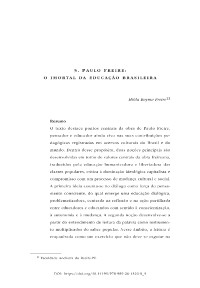Please use this identifier to cite or link to this item:
https://hdl.handle.net/10316.2/41294| DC Field | Value | Language |
|---|---|---|
| dc.contributor.author | Freire, Hilda Bayma | |
| dc.date.accessioned | 2017-04-05T15:04:26Z | |
| dc.date.accessioned | 2020-09-08T12:02:04Z | - |
| dc.date.available | 2017-04-05T15:04:26Z | |
| dc.date.available | 2020-09-08T12:02:04Z | - |
| dc.date.issued | 2017 | - |
| dc.identifier.isbn | 978-989-26-1325-3 | |
| dc.identifier.isbn | 978-989-26-1326-0 (PDF) | |
| dc.identifier.uri | https://hdl.handle.net/10316.2/41294 | - |
| dc.description.abstract | This texts highlights key points of the work of Paulo Freire, intellectual and educator still alive in pedagogical contributions registered in cultural collections in Brazil and around the world. With this aim, this essay develops two central ideas around important values of Freire’s heritage in pedagogy: a humanizing education for freedom of popular classes; critics to the ideological domination of capitalism and engagement with a process of cultural and social changes. The first key idea lies in the dialog as a powerful way to develop awareness. In this context, the dialog and problematizing education stand in the shared refection and action towards awareness, autonomy and change. The second idea is in the reading the word and the world as a way to multiply the popular knowledge. In this sense, reading should be more than an exercice of decodifying word by word, taking part of a process of world intelligence, which enables individuals to democratically think about the world and with the world. | eng |
| dc.description.abstract | O texto destaca pontos centrais da obra de Paulo Freire, pensador e educador ainda vivo nas suas contribuições pedagógicas registradas em acervos culturais do Brasil e do mundo. Dentro desse propósito, duas noções principais são desenvolvidas em torno de valores centrais da obra freireana, traduzidos pela educação humanizadora e libertadora das classes populares, crítica à dominação ideológica capitalista e compromisso com um processo de mudança cultural e social. A primeira ideia assenta‑‑se no diálogo como força do pensamento consciente, do qual emerge uma educação dialógica, problematizadora, centrada na reflexão e na ação partilhada entre educadores e educandos com sentido à conscientização, à autonomia e à mudança. A segunda noção desenvolve‑‑se a partir do entendimento de leitura da palavra como instrumento multiplicador do saber popular. Nesse âmbito, a leitura é enquadrada como um exercício que não deve se esgotar na decodificação e se inscrever em um processo de inteligência de mundo, que ajuda o povo a pensar democraticamente no mundo e com o mundo. | por |
| dc.language.iso | por | - |
| dc.publisher | Imprensa da Universidade de Coimbra | por |
| dc.relation.ispartof | http://hdl.handle.net/10316.2/41289 | por |
| dc.rights | open access | - |
| dc.title | Paulo Freire: o imortal da educação brasileira | por |
| dc.type | bookPart | por |
| uc.publication.firstPage | 97 | - |
| uc.publication.lastPage | 115 | - |
| uc.publication.location | Coimbra | por |
| dc.identifier.doi | 10.14195/978‑ 989‑ 26‑ 1326-0_5 | - |
| uc.publication.digCollection | PB | por |
| uc.publication.orderno | 5 | - |
| uc.publication.area | Ciências Sociais | por |
| uc.publication.bookTitle | Diálogos Freireanos: a educação e formação de jovens e adultos em Portugal e no Brasil | - |
| uc.publication.manifest | https://dl.uc.pt/json/iiif/10316.2/41294/204852/manifest?manifest=/json/iiif/10316.2/41294/204852/manifest | - |
| uc.publication.thumbnail | https://dl.uc.pt/retrieve/11068907 | - |
| uc.publication.parentItemId | 54669 | - |
| uc.itemId | 68986 | - |
| item.grantfulltext | open | - |
| item.fulltext | With Fulltext | - |
| Appears in Collections: | Diálogos Freireanos: a educação e formação de jovens e adultos em Portugal e no Brasil | |
Files in This Item:
| File | Description | Size | Format | |
|---|---|---|---|---|
| paulo_freire._o_imortal_da_educacao_brasileira.pdf | 501.59 kB | Adobe PDF |  |
Items in DSpace are protected by copyright, with all rights reserved, unless otherwise indicated.
